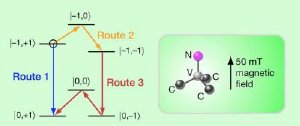Jan 19 2010
Researchers who hope to create quantum computers are currently investigating various methods to store data. Nitrogen atoms embedded in diamond show promise for encoding quantum bits (qubits), but the process of reading the information results in an extremely weak signal. Now physicists have demonstrated a roundabout approach for generating a significantly stronger signal from these sorts of qubits. Their experiment is reported in the current issue of Physical Review B and highlighted with a Viewpoint in the January 19 issue of Physics.
 Driving a qubit along a longer quantum path (routes 2 and 3) dramatically improves the signal quality over that achieved by following the shorter path (route 1). The research applies to information stored in qubits that consisted of Nitrogen-based defects in diamond, as schematically shown on the right. Credit: Alan Stonebraker
Driving a qubit along a longer quantum path (routes 2 and 3) dramatically improves the signal quality over that achieved by following the shorter path (route 1). The research applies to information stored in qubits that consisted of Nitrogen-based defects in diamond, as schematically shown on the right. Credit: Alan Stonebraker
In a quantum computer, a single bit of information is encoded into a property of a quantum mechanical system—the spin of an electron, for example. In most arrangements that rely on Nitrogen atoms in diamond to store data, reading the information also resets the qubit, which means there is only one opportunity to measure the state of the qubit. By developing a technique that involves the spin of the Nitrogen nucleus in the process as well, a team of physicists at the University of Stuttgart in Germany has turned the single step read-out into a multi-step process. Rather than simply resetting the electron-based qubit when the information is read, the researchers discovered that they can force the state of the Nitrogen nucleus to change state twice before the information in the qubit is finally erased. The state of the Nitrogen nucleus doesn't store any useful information, it simply allows the researchers to add steps to the process of reading the qubit's state. This results in a more convoluted quantum mechanical process that triples the number of events that occur before information is destroyed, which in turn strengthens the signal revealing information stored in the qubit.
The resulting signal is still weak, but by combining other clever methods to the problem researchers might one day be able to use impurities in diamond to read and write quantum information at room temperature—which would bring us much closer to creating practical quantum computers.